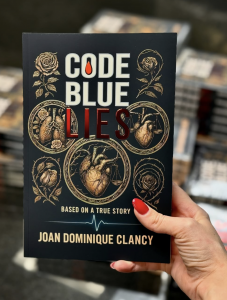“Code Blue Lies” by Joan Dominique Clancy Sparks Nationwide Conversation on Hospital Transparency and Patient Trust
A gripping novel that exposes the real-world risks of flawed hospital records and calls for transparency in patient care.
Every record is a mirror of accountability. When truth disappears from the chart, trust disappears from medicine.”
SCOTTSDALE, AZ, UNITED STATES, November 9, 2025 /EINPresswire.com/ -- What happens when the documents that define life and death can’t be trusted?— Joan Dominique Clancy, Author of Code Blue Lies
Author and advocate Joan Dominique Clancy releases her debut novel, Code Blue Lies, a work of investigative fiction that transforms one of healthcare’s least-discussed failures—falsified or inaccurate medical documentation—into a national conversation about ethics, transparency, and trust in U.S. hospitals.
While the story itself is fictional, Code Blue Lies reflects real-world concerns raised by leading medical organizations about the accuracy of patient records, the reliability of informed-consent documentation, and the legal weight that electronic health records (EHRs) now carry in courtrooms and clinical decisions.
Real-World Evidence Behind the Fiction
A 2024 Candello / Harvard Risk Management Foundation study found that 20 percent of malpractice claims involve documentation errors, and those cases are twice as likely to result in payouts (Harvard RMF, 2024).
In JAMA Network Open, 1 in 5 patients who reviewed their clinical notes found at least one error—40 percent deemed it serious (JAMA, 2020).
The World Health Organization reports that 1 in 10 patients globally suffers preventable harm in healthcare, much of it tied to record-keeping and communication failures (WHO, 2023).
According to the Agency for Healthcare Research and Quality (AHRQ), 44,000 to 98,000 Americans die each year from preventable hospital events—including those rooted in documentation and communication errors (AHRQ PSNet, 2024).
Clancy’s narrative doesn’t accuse any institution; instead, it humanizes these numbers—showing how a missing signature, altered timestamp, or inaccurate diagnosis entry can ripple through a patient’s life and family.
“Every record is a mirror of accountability,” Clancy says. “When the data no longer tells the truth, medicine stops being science—it becomes story. Code Blue Lies is my way of asking what happens when that story is rewritten.”
Fiction as a Catalyst for Transparency
The novel follows a daughter uncovering inconsistencies in her mother’s hospital chart—an entry point into a world where procedure, paperwork, and power collide. As she pieces together what happened, readers confront the moral gray zone between medical innovation and informed consent.
Early readers describe the book as “a whistleblower’s heart inside a novelist’s pen.” Critics note its rare balance of empathy and evidence, dramatizing systemic vulnerabilities without accusation.
Code Blue Lies lands amid a wider public reckoning with data integrity in healthcare. From EHR breaches to falsified timestamps in billing audits, documentation accuracy now shapes malpractice rulings, insurance reimbursements, and even federal funding. By weaving these realities into story form, Clancy hopes to make the issue accessible to every household.
“Transparency starts at the chart,” she adds. “If we can’t trace who entered what, when, and why, then even the best medicine loses its foundation.”
An Urgent Cultural Moment
The release of Code Blue Lies arrives as the U.S. Department of Health and Human Services expands enforcement of the 21st Century Cures Act, which mandates patient access to full electronic records. Yet studies show that many hospitals still restrict visibility into internal edits and metadata.
Legal scholars and medical ethicists warn that documentation falsification—whether intentional or systemic—poses one of the greatest ethical threats to modern medicine. Clancy’s work channels those warnings into fiction, making them tangible for general audiences.
Her message is reformative rather than punitive: to rebuild trust by restoring transparency.
About the Author
Joan Dominique Clancy is an Arizona-based designer, entrepreneur, and advocate known for integrating art with social purpose. She founded Stolen Dreams Press to champion works that merge storytelling and public-interest impact. Her broader portfolio spans healthcare ethics, philanthropy, and women-led entrepreneurship. Code Blue Lies is her literary debut.
About Stolen Dreams Press
Stolen Dreams Press publishes narrative works that bridge art and accountability, spotlighting authors who turn personal experience into catalysts for change. Through books, essays, and advocacy campaigns, the imprint supports creative voices confronting injustice with compassion and clarity.
Availability
Code Blue Lies is available now in paperback and ebook formats at www.codebluelies.com.
Joan clancy
CODE BLUE LIES BOOK
email us here
Visit us on social media:
Instagram
Other
Legal Disclaimer:
EIN Presswire provides this news content "as is" without warranty of any kind. We do not accept any responsibility or liability for the accuracy, content, images, videos, licenses, completeness, legality, or reliability of the information contained in this article. If you have any complaints or copyright issues related to this article, kindly contact the author above.



